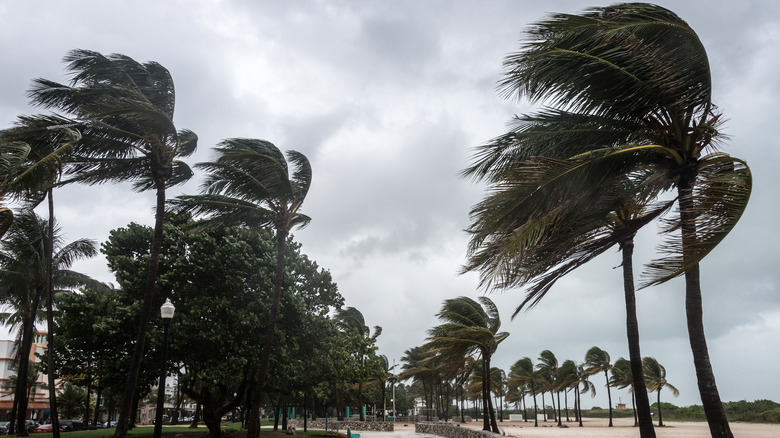One Mistake To Avoid When Planning Your Next Trip To Florida
In 1970, Florida was officially nicknamed the Sunshine State. To some travelers, that might conjure up images of sunny beaches that are fun for the whole family. There are certainly beaches like that in Florida, but it would be a mistake, while planning a trip here, to assume that the weather is always going to be warm and sunny.
As a peninsula, Florida is vulnerable to hurricanes on all sides. The Gulf Coast and Atlantic Coast have a combined length of almost 8,500 miles, so the state's shoreline is second only to Alaska as the longest in the U.S. The impact of hurricane season on Florida isn't limited to summer or the coast, either. The season lasts a full six months, from June through November. Even before the peak of it hits from mid-August to late October, you'll start to feel the effects of the rainy season. Lightning and thunderstorms — even sometimes tropical storms — begin ramping up in mid-to-late May.
Being inland at a theme park in Central Florida won't necessarily keep you dry, either. A hurricane can make landfall 100 miles away and still pound other parts of the state with wind and rain. While Universal Orlando and Disney World are usually open year-round, it's not unheard of for them to close when a storm is bearing down. In 2022, both resorts closed fully for Hurricane Ian, and in 2023, they suspended some attractions and other services for Hurricane Idalia.
Don't assume it will be warm and sunny in Florida
None of this is meant to dissuade anyone from visiting Florida. Just be prepared to experience some intermittent rain if you're visiting in the summertime. Afternoon storms are a common occurrence in places like Tampa, where the Busch Gardens theme park is located. At the same time, summer storms often come and go quickly, so you might see the sky clear up and be able to enjoy beautiful, sunny weather later the same day. It's less enjoyable when you're already soaked, of course, so it can't hurt to bring an umbrella or raincoat.
Finally, don't underestimate the need to pack a little warm for winter in Florida. It's not only Christmas in The Wizarding World of Harry Potter where a scarf might come in handy in the evening. Even in South Florida, it can still get cold and leave you dressing by the heater in the morning. Winter temperatures in West Palm Beach average in the low 60s. Tallahassee in North Florida gets into the mid-40s. There have been some rare cases in recent years where Tallahassee and other cities in the Panhandle, like Pensacola, dipped below freezing and even saw snow. While winters are mild overall and the climate is still subtropical, it could get chilly if you're dressed for the beach. Again, just temper your expectations when it comes to the Sunshine State, and don't let the nickname fool you.

